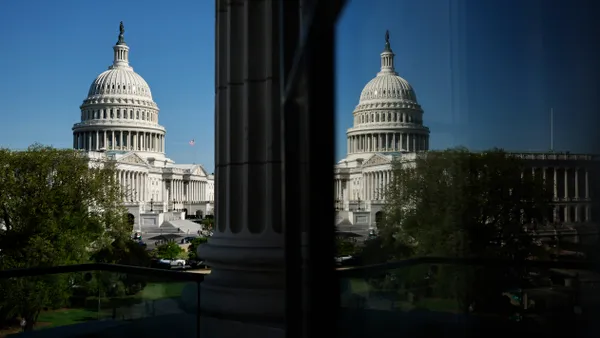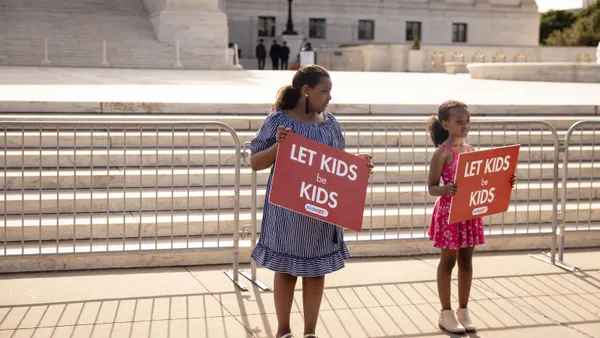Dive Brief:
- The 4th U.S. Circuit Court of Appeals denied a request to temporarily block the U.S. Department of Education's funding restrictions for Virginia's Fairfax County Public Schools, dealing a blow to one of the nation's largest school districts in its legal battle against the Trump administration's Title IX enforcement.
- Fairfax filed the lawsuit in August after the Trump administration put the district’s federal funding on "reimbursement only" status, because it said the district was in violation of Title IX when it allowed transgender students to use bathrooms aligning with their gender identities.
- Fairfax's lawsuit was filed in the U.S. District Court for the Eastern District of Virginia, but the lower court refused to pause the administration's funding restrictions, saying the district should have challenged the Education Department in federal claims court instead. The 4th Circuit decision on Oct. 1 affirms the lower court's ruling.
Dive Insight:
The courts' decisions to greenlight the administration's federal funding status changes in Fairfax are due to procedural issues rather than a judgement on whether Fairfax's challenge to the administration is valid, education policy experts say. Federal claims court is specialized for monetary claims against the U.S. government, whereas district court — where Fairfax filed — oversees a much broader range of civil and criminal cases.
Otherwise, the 4th Circuit decided in 2020 in Gavin Grimm v. Gloucester County School Board that transgender student Gavin Grimm's Title IX rights were violated when his school board restricted him from using the same restrooms as other boys and girls, and instead required him to use an “alternative appropriate private facility” separate from the rest of the student body. In August, the 4th Circuit reaffirmed that “Grimm remains the law of this Circuit” in a separate South Carolina case also related to transgender student rights in accessing facilities aligning with their gender identities.
Fairfax is one of the first districts to sue over the Trump administration's new Title IX enforcement approach, which it did so along with neighboring school district Arlington Public Schools. The two districts, as well as three others, were found by the department in July to have violated Title IX due to their transgender student-inclusive policies.
The "reimbursement only" status means that the department flags the school districts as “high-risk” in its internal systems for when the districts apply for discretionary grants, and that it will only be providing federal funding through reimbursements. That means the Northern Virginia districts will now be required to pay their education expenses up front and then request reimbursement for expenditures to access Education Department funding.
The other three districts are Alexandria City Public Schools, Loudoun County Public Schools and Prince William County Public Schools.
The Virginia districts were among the first districts to experience "reimbursement only" repercussions as a result of the department's Title IX enforcement — and the first to challenge the federal government's strategy to strongarm Title IX compliance through such means.
In its lawsuit, Fairfax said the administration's decisions cost the district $167 million in federal funds, which were allotted for food and nutrition for low-income students, services for students with disabilities, support for students experiencing homelessness, English learners, career and technical education, and professional development for teachers and administrators.
The school system and federal government are at odds over whether the Education Department's decision has actually cost the district funding. Fairfax said in a Sept. 25 court filing that the department “already withheld and will certainly continue to withhold reimbursements.” However, the Education Department told K-12 Dive that it had not withheld any funding so far.
A report released by PEN America last week said that districts were feeling the blowback from culture wars that began at the school board level years ago in the form of book bans on LGTBQ+ and race-related issues. Those issues have now reached the federal government, such as by the Education Department interpreting and enforcing federal law, including Title IX, to exclude LGBTQ+ students from education spaces, athletics and initiatives.
That approach is increasing pressure on districts and leading to legal costs for districts in some cases, PEN America said.














